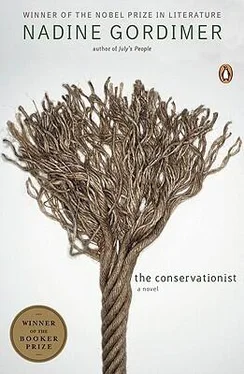— Come. Come and look, they’re all saying. What is it? Who is it? It’s Mehring. It’s Mehring, down there.
Witbooi offered to make a coffin. They used a tarpaulin in the meantime, weighted with stones from that place where the whites once cooked meat. Izak helped saw the planks at the workshop near the house; Alina brought tea and porridge and stayed to talk, but not loudly, because of what it was the two men were hammering together. Jacobus had phoned the farmer in town at his office and asked for money for the wood. It was granted without questioning or difficulty, yes, all right, get it from the Indian and tell him he’ll be paid. Jacobus knew, through Alina’s daughter’s husband (Christmas Club) that the India had wood stored from some building he had been doing. But the farmer didn’t want to hear about it. He was leaving that day for one of those countries white people go to, the whole world is theirs. He gave some instructions over the phone; Jacobus must look after everything nicely.
Jacobus and Alina and one of the other women went to the Indian store together, with the pick-up, to fetch the wood. The women cried and said there was no money for a wrapping-cloth and wouldn’t the India give them some material, anything, any piece of old cloth? He felt sorry for the poor devils, human after all, who must have lost a member of their family, and got one of his sons to cut a length from a roll of Japanese cotton that wasn’t a good seller. They said God would bless him.
The funeral took place on high firm ground on a fine Thursday afternoon. Solomon and his brother had dug the grave. The coffin that now held properly what it should was put on the hay wagon hitched to the tractor and driven by Jacobus slowly enough for all to follow on foot. Plovers flew up peeping, shrilling, darting and diving ahead, raising their usual excitable alarm in a serenity of sky and land that took no note of them. The tractor rolled on. At the appointed spot, those people who had not followed were gathered; old Thomas the nightwatchman did not sleep that afternoon, and the children stood by. The women and old men from the location who weeded the lands were there. So was Phineas’s wife, but her followers were not with her. Thursday is the day when the women members of the sect of Zion meet in groups on the veld round about the location, and one of these appeared, led by a man in a long white coat with blue sashes criss-crossing it, carrying a tasselled staff, and accompanied by a man with a drum. He struck the drum softly once or twice: the sound of a sigh in space, the great sun-lit afternoon that surrounded the gathering. There was a moment of absolute silence when everyone was still, perhaps there was no need of speech, no one knew what to say, and then the one with the staff began to declaim and harangue, sometimes lifting a foot in the air as if to climb some invisible step, waving his staff. The women of his group, round white hats starched and ironed into the shape of four-petalled flower-bells, sang a hymn. He prayed aloud again and once more they sang, and Thomas’s voice joined them in thin but perfect harmony. The eyes of the children moved with the spade. Phineas’s wife’s face was at peace, there was no burden of spirits on her shoulders as she watched Witbooi, Izak, Solomon and Jacobus sink the decent wooden box, and her husband shovel the heavy spatter of soil, soft and thick. Without consulting Jacobus, Witbooi had privately provided a pile of medium-sized stones to surround the mound as he would mark out a flower-bed in a white man’s garden.
The one whom the farm received had no name. He had no family but their women wept a little for him. There was no child of his present but their children were there to live after him. They had put him away to rest, at last; he had come back. He took possession of this earth, theirs; one of them.












